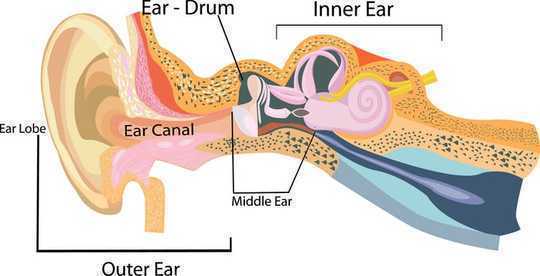 Looking out the window instead might stop you feeling sick, but that doesn’t work for everyone. Vadiar/Shutterstock, CC BY
Looking out the window instead might stop you feeling sick, but that doesn’t work for everyone. Vadiar/Shutterstock, CC BY
Reading in the back seat can make you feel sick because your eyes and ears are having an argument that your brain is trying to settle!
When you’re reading in the back seat, your eyes see that your book is still. Your eyes then tell your brain you are still.
But your ears feel the car is moving. Your ears then tell your brain you’re moving.
How can your ears tell you’re moving?
Your ears don’t just hear, they help with your balance too.
Get The Latest By Email
Your ear has three main parts:
- the outer ear is the bit you can see on the side of someone’s head
- the middle ear is your eardrum and some tiny bones and muscles
- the inner ear is the part of your ear that can help with your balance.
 The ear includes more than what you see on the outside. sanjayart/Shutterstock
The ear includes more than what you see on the outside. sanjayart/Shutterstock
Your inner ear contains cells that have hairs sticking out the top. Scientists call these “hair cells”.
Some of these hair cells help us to hear. When sound hits those hair cells, the hairs move and the cells send signals to the brain. Our brains use those signals to hear.
Other hair cells help us to keep our balance. When the car we’re sitting in moves, that movement makes the hairs on those hair cells move too, and they send different signals to the brain. Our brain uses those different signals to tell we’re moving.
Why doesn’t the brain like this?
Some people’s brains don’t like it when their eyes say they’re still but their ears say they’re moving.
When eyes and ears argue like this, the brain can think that something dangerous might be about to happen.
If this happens, the brain can get the body ready to fight or run away (scientists call this the “fight or flight” response).
 The conflict between our eyes and ears make the brain think something dangerous might happen. wavebreakmedia/Shutterstock
The conflict between our eyes and ears make the brain think something dangerous might happen. wavebreakmedia/Shutterstock
One of the things the brain can do is take blood away from the stomach to give to the muscles.
Giving blood to the muscles can help us to fight or run away. But taking blood away from the stomach can make us feel sick.
What can you do about it?
If reading in the back seat makes you feel sick, you might need to settle the argument between your eyes and your ears.
One way to do this is to stop reading and to look out the car window. This could help your eyes to tell your brain that you’re moving as you see the world whizz by, and your ears to tell your brain that you are moving as you feel the car moving.
But this suggestion won’t work for everyone. Some people will still feel sick when they ride in a car, even if they aren’t reading.
This is because while our eyes and our ears help us to balance, so do our skin and our muscles. This creates many opportunities for arguments that our brain has to settle!
About The Author
Wayne Wilson, Associate Professor in Audiology, The University of Queensland
This article is republished from The Conversation under a Creative Commons license. Read the original article.
books_health







